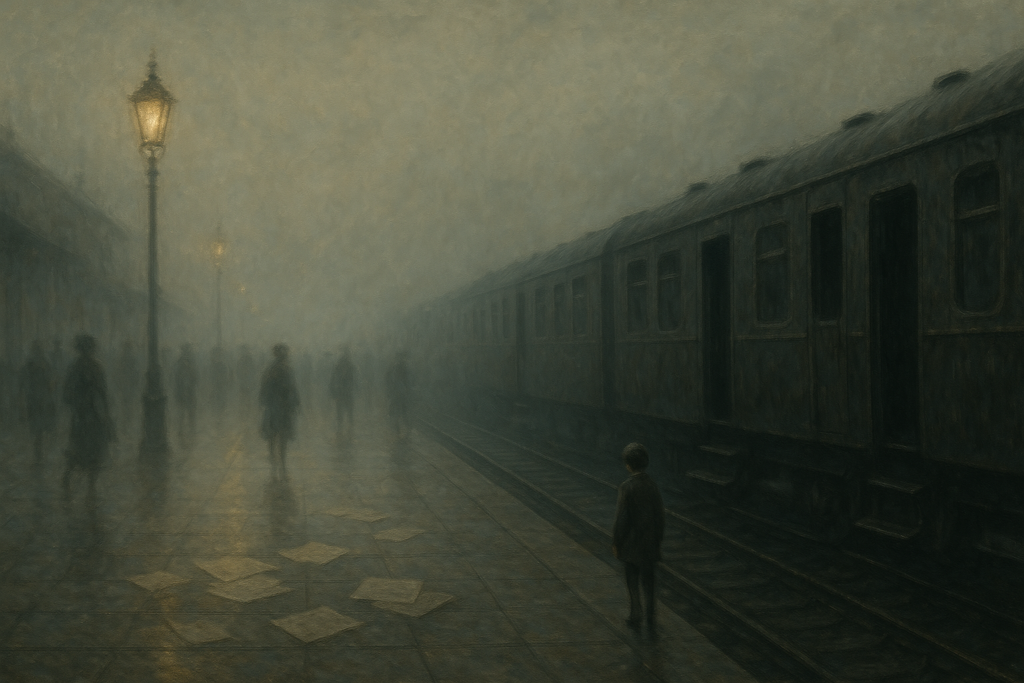Every poem I write begins with an image — a bright, often anxious flash of emotion or experience that demands to be embodied in words.
My latest work, “Departure,” was born from the chaotic energy of a train station—a place where beginnings and ends collide in a whirlwind of movement and noise. Initially, it was just a sketch, but it soon grew into a reflection on change, identity, and human existence in a world that seems unpredictable and overwhelming.
The poem opens with the arrival of a train: it “lazily rolled in,” looking shabby, and its doors—“blackened eye sockets”—set a gloomy, almost ominous tone. The crowd, “crumpled by the steel roar” and “rushing past like a frightened bird,” transforms into a single, chaotic entity whose movement is both mesmerizing and frightening. These images are not just descriptions; they are metaphors for the chaos and uncertainty of life, especially in moments of transition. The poem’s protagonist, a “quirky wanderer,” a “traitor and exile” from his homeland, embodies a sense of alienation—he is a stranger in a world that moves without him. His frantic run to the last carriage carries anxiety, perhaps even a desperate attempt to catch up—to a new beginning or to escape.
Why did I write this poem now? The answer lies in the world we live in. We exist in an era of rapid changes—technological, social, political—where the ground beneath our feet feels unsteady. The themes of “Departure”—alienation, self-discovery, anxiety before departure—resonate in our time, when many of us feel like wanderers trying to find our place in a constantly changing world.
For me, creating this poem was a personal journey. It allowed me to confront my own experiences of departure and change, to explore the fears and hopes that accompany any significant transition. The train station, with its perpetual motion, became a metaphor for my own life—always on the move, always changing, never still. The protagonist’s run to the last carriage reflects my own habit of feeling like I’m always catching up, always hoping that I’m sufficiently prepared for what lies ahead. And the repeated “hoping in vain” is an echo of my anxiety, the fear that no matter how hard I try, something will always be left behind.
But “Departure” is not just personal; it’s a reflection on the human condition as a whole. It asks questions: how do we navigate a world that seems chaotic and indifferent? How do we find our place in the crowd, our direction in the noise? And perhaps most importantly—how do we maintain hope when the future is so uncertain?
In reading “Departure,” I invite you to reflect on your own journeys—both real and metaphorical. Recall the moments when you stood on the platform, watching a departing train, or ran to catch the last carriage. Think about how you cope with the chaos of change, how you experience the anxiety before the unknown, and what you hope for as you enter a new chapter in your life. For me, this poem is a reminder that even amidst the chaos, there is beauty in the journey, and every departure, no matter how frightening, carries the promise of a new beginning.
Thank you for joining me in this exploration.
Отправление
Лениво въехал поезд. Выглядел убого.
Дверей разинул почерневшие глазницы
Толпа, скомкавшись от стального рёва
Промчалась предо мной, напуганною птицейИ вот он я, чудаковатый странник,
Неровной поступью подкравшийся к перрону,
Печальной родины изменник и изгнанник,
Несусь стремглав к последнему вагону.Напрасно понадеявшись, что вещи не забыл,
Напрасно понадеявшись, что думал наперед,
Напрасно понадеявшись, что двери все закрыл,
Напрасно понадеявшись, что кто-то меня ждёт.
Departure
Lazily, the train rolled in, so rundown, poor,
Its blackened doors gaped open like hollow eyes.
The crowd, all crumpled by that steel-bound roar,
Swept past me, frightened birds in frantic cries.And here I stand, an odd, peculiar stray,
With stumbling steps I creep along the track,
A traitor to my homeland, cast away,
I dash headlong to the last car at the back.In vain I hoped I’d left no cherished thing behind,
In vain I hoped I’d planned it all before,
In vain I hoped each door was safely sealed in mind,
In vain I hoped that someone waits once more.
Until next time.
